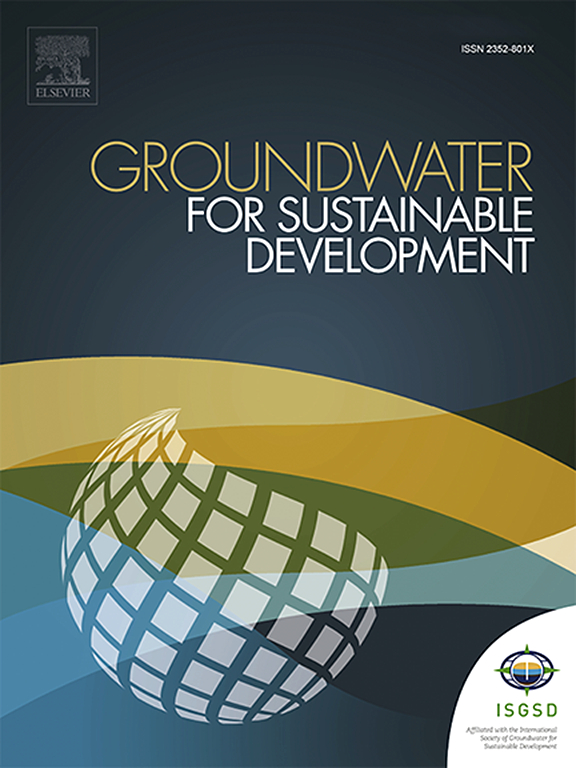A review of drivers contributing to unsustainable groundwater consumption in Pakistan
IF 4.9
Q2 ENGINEERING, ENVIRONMENTAL
引用次数: 0
Abstract
Groundwater depletion in Pakistan, particularly in the Indus Basin, poses a severe threat to agricultural sustainability, water security, and economic stability. Over the past few decades, groundwater extraction has surged dramatically, with the number of tube wells increasing by 1500% from 1975 to 2021, reaching 1.4 million. Currently, groundwater supplies 60% of irrigation water, 90% of domestic water, and 100% of industrial water. However, this extensive reliance has resulted in significant water table declines, especially in canal command areas and urban centers. This study synthesizes insights from scientific literature, policy documents, and technical reports to examine the key drivers contributing to unsustainable groundwater consumption in Pakistan. Weak governance structures, inadequate regulatory mechanisms, and increasing agricultural water demand—where five major crops (rice, wheat, cotton, sugarcane, and maize) consume 85% of total water resources while contributing less than 5% to GDP—have led to unchecked groundwater exploitation. The historic 80.3 billion cubic meters (BCM) of annual recharge in the upper Indus plain is now outpaced by extraction, exacerbating the crisis. Climate variability, including a 19% reduction in surface water irrigation area from 2003 to 2021, has further increased reliance on groundwater. Despite some recent policy efforts, such as the Punjab Water Act (2019) and KP Water Act (2020), enforcement remains weak due to institutional constraints and political barriers. There is an urgent need for adaptive groundwater governance, integrating scientific knowledge, regulatory mechanisms, and technological innovations. A transition from an open-access regime to a regulated system, supported by robust monitoring and data-sharing mechanisms, is critical for long-term sustainability. This review highlights urgent policy gaps and provides recommendations to strengthen groundwater governance in Pakistan and other regions facing similar challenges.

对巴基斯坦不可持续地下水消耗驱动因素的审查
巴基斯坦,特别是印度河流域的地下水枯竭,对农业可持续性、水安全和经济稳定构成严重威胁。在过去的几十年里,地下水开采量急剧增加,从1975年到2021年,管井数量增加了1500%,达到140万口。目前,地下水提供了60%的灌溉用水,90%的生活用水和100%的工业用水。然而,这种广泛的依赖导致了地下水位的显著下降,特别是在运河指挥区和城市中心。本研究综合了来自科学文献、政策文件和技术报告的见解,考察了导致巴基斯坦地下水消耗不可持续的主要驱动因素。治理结构薄弱、监管机制不完善以及农业用水需求不断增加——其中五种主要作物(水稻、小麦、棉花、甘蔗和玉米)消耗了总水资源的85%,而对gdp的贡献却不到5%——导致了地下水不受控制的开采。印度河上游平原每年803亿立方米(BCM)的历史补给量现在被开采超过,加剧了危机。气候变率,包括2003年至2021年地表水灌溉面积减少19%,进一步增加了对地下水的依赖。尽管最近做出了一些政策努力,如《旁遮普省水法》(2019年)和《KP水法》(2020年),但由于制度限制和政治障碍,执行力度仍然薄弱。迫切需要对地下水进行适应性治理,将科学知识、监管机制和技术创新相结合。在强有力的监测和数据共享机制的支持下,从开放获取制度过渡到受监管的制度,对长期可持续性至关重要。这份审查报告突出了巴基斯坦和其他面临类似挑战的地区急需的政策缺口,并提出了加强地下水治理的建议。
本文章由计算机程序翻译,如有差异,请以英文原文为准。
求助全文
约1分钟内获得全文
求助全文
来源期刊

Groundwater for Sustainable Development
Social Sciences-Geography, Planning and Development
CiteScore
11.50
自引率
10.20%
发文量
152
期刊介绍:
Groundwater for Sustainable Development is directed to different stakeholders and professionals, including government and non-governmental organizations, international funding agencies, universities, public water institutions, public health and other public/private sector professionals, and other relevant institutions. It is aimed at professionals, academics and students in the fields of disciplines such as: groundwater and its connection to surface hydrology and environment, soil sciences, engineering, ecology, microbiology, atmospheric sciences, analytical chemistry, hydro-engineering, water technology, environmental ethics, economics, public health, policy, as well as social sciences, legal disciplines, or any other area connected with water issues. The objectives of this journal are to facilitate: • The improvement of effective and sustainable management of water resources across the globe. • The improvement of human access to groundwater resources in adequate quantity and good quality. • The meeting of the increasing demand for drinking and irrigation water needed for food security to contribute to a social and economically sound human development. • The creation of a global inter- and multidisciplinary platform and forum to improve our understanding of groundwater resources and to advocate their effective and sustainable management and protection against contamination. • Interdisciplinary information exchange and to stimulate scientific research in the fields of groundwater related sciences and social and health sciences required to achieve the United Nations Millennium Development Goals for sustainable development.
 求助内容:
求助内容: 应助结果提醒方式:
应助结果提醒方式:


